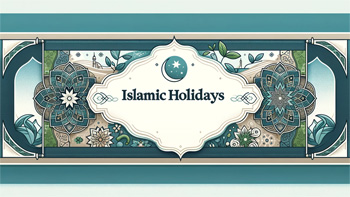The Islamic calendar, rich in cultural and spiritual significance, marks several holidays that are vital to the Muslim faith. These holidays not only offer a time for celebration and joy but also embody deep religious meaning, reflecting the core beliefs and history of Islam. This extensive exploration delves into the most notable Islamic holidays, their origins, customs, and the ways they impact the lives of believers worldwide.
Eid al-Fitr: The Celebration of Breaking the Fast
Eid al-Fitr, also known as the Festival of Breaking the Fast, marks the end of Ramadan, the Islamic holy month of fasting. It is a joyous occasion that celebrates the completion of a month of sunrise-to-sunset fasting, prayer, and reflection. Eid al-Fitr begins with a special prayer known as Salat al-Eid and is followed by feasting, giving of charity (Zakat al-Fitr), and social gatherings. The festival fosters a sense of gratitude and community, emphasizing the virtues of generosity and kindness.
Eid al-Adha: The Festival of Sacrifice
Eid al-Adha, or the Festival of Sacrifice, commemorates the willingness of Prophet Ibrahim (Abraham) to sacrifice his son as an act of obedience to Allah. It coincides with the annual Hajj pilgrimage and is celebrated by the ritual sacrifice of an animal, usually a sheep or a goat. This act symbolizes devotion to Allah and the distribution of meat to the needy, embodying the principles of charity and empathy. Eid al-Adha is marked by special prayers, feasting, and the exchange of gifts among family and friends.
Ramadan: The Holy Month of Fasting
Ramadan, the ninth month of the Islamic lunar calendar, is a period of fasting, introspection, and prayer for Muslims. Believers abstain from food, drink, and other physical needs during daylight hours, as a means of purifying the soul and developing self-discipline. Ramadan is also a time for increased prayer and recitation of the Quran. The month aims to cultivate a heightened sense of spiritual connectedness and gratitude, with the nightly Taraweeh prayers and the eventual celebration of Eid al-Fitr as its culmination.
The Night of Power: Laylat al-Qadr
Laylat al-Qadr, known as the Night of Power or Decree, is considered the holiest night in the Islamic calendar. It commemorates the night when the Quran was first revealed to the Prophet Muhammad. Laylat al-Qadr falls within the last ten nights of Ramadan, with specific emphasis on the odd-numbered nights. Muslims spend this night in prayer, study, and reflection, believing that the rewards for worship on this night are greater than a thousand months of worship.
Mawlid al-Nabi: Celebrating the Prophet's Birthday
Mawlid al-Nabi marks the birth of the Prophet Muhammad and is observed with varying degrees of celebration across the Islamic world. While not universally celebrated, where it is observed, Mawlid includes communal prayers, recitation of the Prophet's life and teachings, and distribution of food and charity. The day offers a moment to reflect on the virtues and life of the Prophet, inspiring Muslims to embody his teachings in their daily lives.
Islamic New Year: Hijri New Year
The Islamic New Year, also known as Hijri New Year, marks the beginning of the new Islamic lunar calendar year. This day commemorates the migration (Hijra) of the Prophet Muhammad from Mecca to Medina, a pivotal event in Islamic history. Unlike festive celebrations in other cultures, the Islamic New Year is observed with quiet reflection, prayer, and an emphasis on the lessons learned from the Hijra. It is a time for Muslims to ponder the passage of time and their own spiritual progress.
Ashura: A Day of Remembrance
Ashura, observed on the 10th day of Muharram, the first month of the Islamic calendar, holds different significances for Sunni and Shia Muslims. For Sunni Muslims, it marks the day when Moses and the Israelites were saved from Pharaoh's tyranny. For Shia Muslims, it is a solemn day commemorating the martyrdom of Hussein ibn Ali, the grandson of the Prophet Muhammad, at the Battle of Karbala. Ashura is observed through fasting, charitable acts, and in Shia communities, through mourning rituals and reenactments of the battle.
Islamic holidays, with their rich history and profound spiritual significance, play a crucial role in the lives of Muslims. They provide a time for community, reflection, and rejuvenation of faith. Through these celebrations and observances, Muslims across the world connect with their heritage, understand deeper meanings of their faith, and strengthen bonds within their communities.
